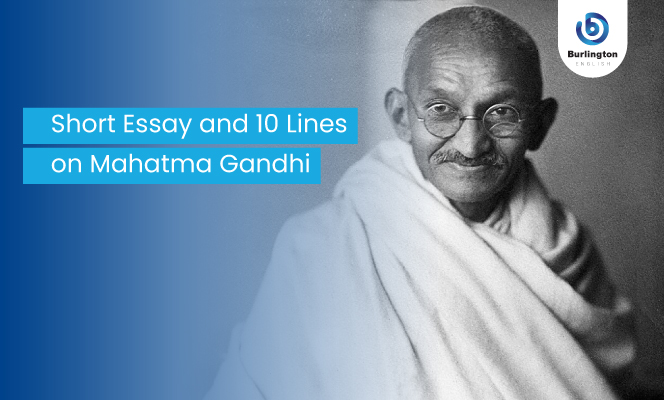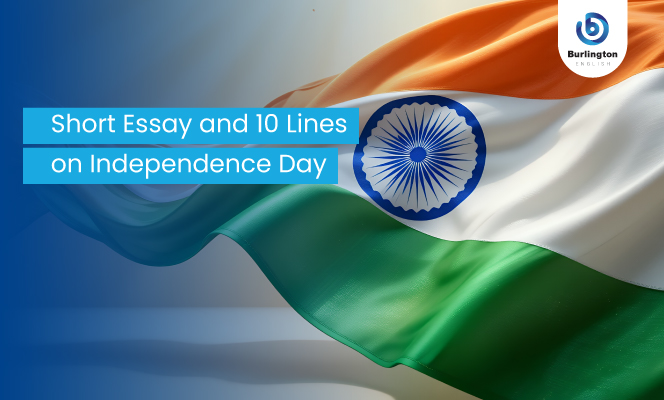The Life of Mahatma Gandhi – An Essay Writing Approach
As Gandhi Jayanti approaches, students anticipate yet another essay on the great philosopher and leader Mahatma Gandhi in school boards nationwide. However, writing biographical essays can be confusing, especially as learners are sometimes afraid of missing crucial events in the life of the grand figure. To make this Gandhi Jayanti easier for our young students, we have created a list of 10 lines about the Mahatma Gandhi’s life, followed by a sample essay. The pointers will serve as support for the students as they approach their essays:
10 lines on Mahatma Gandhi For Grades 1 to 5
- M. K. Gandhi’s full name was Mohandas Karamchand Gandhi.
- Indians call him ‘Father of the Nation’.
- His birthday is celebrated as the International Day of Non-Violence.
- He was born on October 2, 1869, in Porbandar, India.
- Gandhi believed in being truthful and non-violent.
- He was a freedom fighter.
- Gandhi led many freedom movements to free India from British rule.
- His birthday is celebrated as the International Day of Non-Violence.
- In 1996, his image started appearing on bank notes.
- He has written many books.
A short essay on Mahatma Gandhi for Grades 1 to 5
One of India’s greatest leaders was Mohandas Karamchand Gandhi. Many people affectionately called him Bapu. On 2nd October 1869, he was born in the town of Porbandar. He started his career as a lawyer and proceeded to be come a civil rights activist. After his experiences in South Africa, where he faced discrimination, he devoted his life to achieving India’s freedom. He believed that one could be strong and bring about a revolution without engaging in violence.
Mahatma Gandhi taught everyone to be truthful and live in harmony. He demonstrated to us that kindness and non-violence are the best ways to resolve conflicts. His modest lifestyle and attire taught us that being good on the inside is more important. To spread his teachings, he has written many books like ‘The Story of My Experiments with Truth’ and ‘Hind Swaraj’.
Gandhi serves as an inspiration to those who aspire to change the world.
10 lines on Mahatma Gandhi For Grades 6 to 8
- Mahatma Gandhi’s full name is Mohandas Karamchand Gandhi.
- He is recognised as India’s ‘Father of the Nation’.
- Mohandas Karamchand Gandhi was born in Porbandar, India, on 2 October 1869 to Karamchand Gandhi, a politician who was the Diwan of Porbandar, and Putlibai Gandhi, who significantly shaped Mahatma Gandhi’s values through her own belief in Jainism.
- He believed in living a simple life of truth, self-discipline and non-violence.
- Gandhi was also a supporter of empowerment through basic education, where students would learn through experiences.
- In 1915, the veteran Indian philosopher and writer Rabindranath Tagore honoured Gandhi with the title of ‘Mahatma’, recognising his determination to fight for India’s freedom through peaceful means using satyagraha and ahimsa.
- His philosophy of non-violence has inspired many people in India and abroad, including the global leader, Martin Luther King Jr.
- The ‘International Day of Non-violence’ marks his birthday every year.
- Gandhi led several major movements during India’s freedom struggle, such as The Salt March (1930) and the Quit India Movement (1942).
- He believed in self-reliance and encouraged the manufacturing and crafting of indigenous goods through the Swadeshi Movement as a means of rejecting British goods.
A Short Essay on Mahatma Gandhi for Grades 6 to 8
Mohandas Karamchand Gandhi, who would grow up to become Mahatma Gandhi, was born on October 2, 1869, in Porbandar, Gujarat. His father was Karamchand Gandhi, a political leader who worked as the Diwan or Chief minister of Porbandar. His mother, Putlibai Gandhi, was a simple religious woman who greatly influenced Mahatma Gandhi’s values and ideologies in life.
Gandhi is one of the most inspiring leaders in the world. With his principles of ahimsa and satyagraha, he played a significant role in India’s freedom struggle against the British. He inspired peaceful protests, aiming at change without violence and bloodshed.
Gandhi led the Salt March in 1930 and the Quit India Movement in 1942, encouraging millions of Indians to fight for their freedom. He led the path to simplicity, truth, and service to humanity and believed in the dignity of everyone, irrespective of their caste, creed, or religion. Gandhi also advocated for empowering individuals through basic education that emphasised experiential learning. In 1915, Rabindranath Tagore conferred upon him the title of ‘Mahatma’ for his persistent belief in truth and non-violence and his efforts to fight for India’s freedom by peaceful means.
Gandhi inspired not only Indians with his principles but also several global leaders in their fights for change. He has left behind a legacy of peace and non-violence that will continue to live till the time humanity exists.







